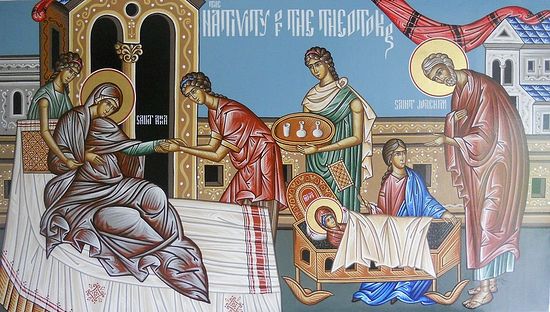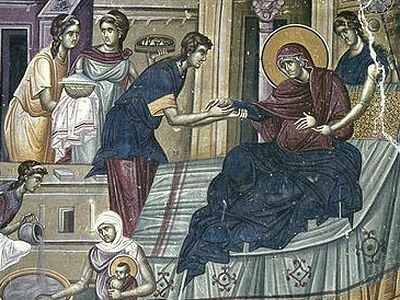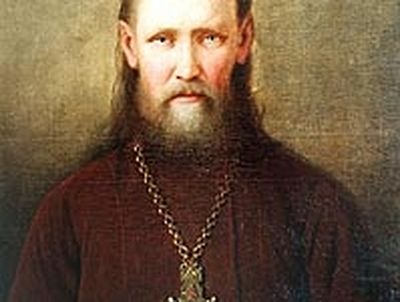Source: Hermitage of the Holy Cross
There is no great event which is not proceeded with great longing and expectation. This Great Feast of the Nativity of the Mother of God is no exception. This first of Feasts, celebrated on the eighth day of the New Church Year, was certainly preceded by great longing and expectation. First, we have the longing of the blessed parents of the Blessed Ever-Virgin, Joachim and Anna. Finding themselves childless even in old age and thus ashamed in front of Jewish society, they pleaded with God to relieve them of the curse of childlessness, a shame which even caused Joachim to be rejected from his service at the Temple and which sent him into the wilderness to plead with the Lord. Joachim and Anna did not lose their faith or cease their prayers even when it seemed that all the law of nature was set against them because of their age. Rather, they lived and prayed with longing and the expectation of deliverance. Secondly, we have the longing and travail of the human race itself, which was until the dawn of Grace laboring under the yoke of the old law, the condemnation of the sin of our first ancestors, and the corruption of death. The people of the world had descended to such a state of moral degradation that it hardly seemed possible to redeem mankind. Indeed, it would take the very entry of God Himself, incarnate, into human history in order to save mankind inasmuch as the law was powerless to save it. Mankind, like Anna, was barren, not bringing forth fruit. The whole world was in longing, and the righteous, such as Joachim and Anna and Symeon the God-Receiver, were filled with expectation.
If the Incarnation of the Son of God was the rising of the Sun upon the darkness of the Earth, then surely the Birth of the Chosen Virgin and Bride of God was the dawn of morning breaking through the dark night of humanity. The child of Joachim and Anna was chosen before the ages by Divine Providence, was born of an aged woman thought to be barren, was offered as a pure sacrifice to God by her parents, was brought into the temple and preserved and nourished by the angelic hosts until her coming of age, entrusted to the aged Joseph, and then mystically conceived the Incarnate Word in her virginal womb. She contained the One who cannot be contained, and her womb became more spacious than the heavens. In the same way that every great musician needs an instrument to create the melodies that well up in his soul and demand to make their way into the world, so God arranged everything for our salvation by making use of one perfect instrument, the Ever-Virgin Mary. Her Nativity represents a critical moment in the history of the universe, her birth represents the coming of the fullness of time, the end of the Old Law and the sounding forth of the first notes of the melody of the New Law, the Law of Love and salvation through Grace.
From the time of the Apostles and through the centuries, Orthodox Christians have devoted themselves and their talents to the Mother of God, the Gate of our Salvation. Hymnographers have composed new hymns, canons, and Akathists to her, Iconographers have created a multitude of types, each expressing something slightly different about the Mother of God, her life on earth and her intervention into human life through miracles and appearances. Many have built great temples and whole monasteries in her honor. Out of devotion saints have written their own private prayers and songs to the Mother of God, asking her to take them under her saving omophorion and bring them into the Heavenly Kingdom. Each of us, even if we are not hymnographers or iconographers by talent, must also create our own devotion to the Mother of God. Our song of devotion should be our very life. Let us ask the Mother of God to take us and plant us in her little garden, even if we seem to be the worst of weeds, so that she can tend to us and guide us on the way to Heaven. Amen.



